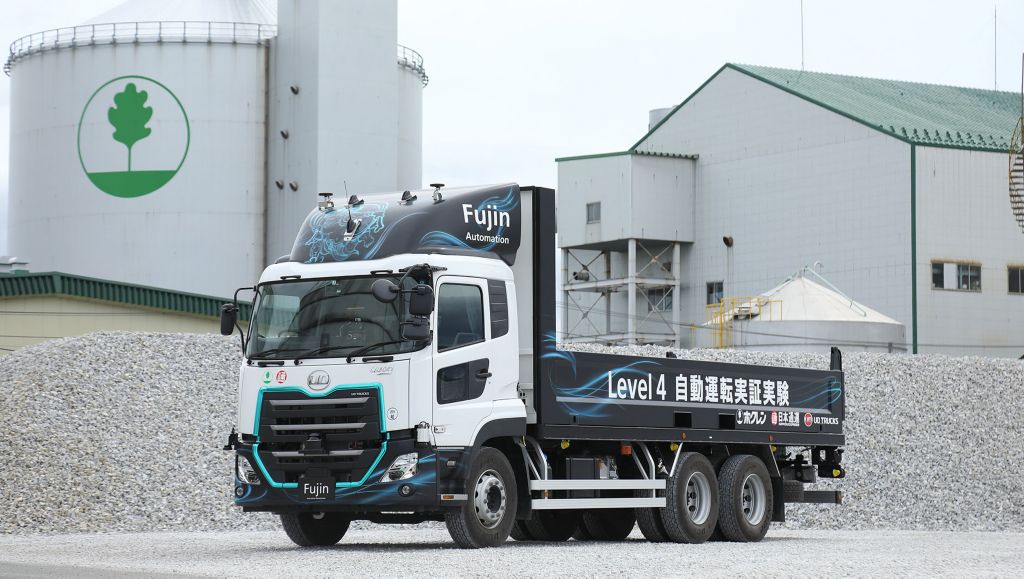UD Trucks conduct Japan’s first autonomous driving test by heavy-duty trucks


"By combining the expertise of commercial vehicle manufacturers, logistics companies and the agricultural sector, we have shown that autonomous driving technology plays an essential role in enhanced safety, increased energy- and fuel efficiency and consequently an improved productivity,” says UD Trucks President Takamitsu Sakamaki.
The test program, which began on August 5 and is set to end on August 30, demonstrated how produce can be moved through the processing center. A specially adapted L4 heavy-duty Quon vehicle from UD Trucks operated on a typical delivery route from the entrance to the produce acceptance area, interim storage and the final unloading area at an average speed of 20 kph. The route included a distance of 200 meters on a public road (National Route 334).
UD Trucks is a leader in the use of L4 automation in Japan, the last step towards Level 5 (L5) fully-automated transportation, allowing the vehicle full autonomy over every aspect of driving in a predefined operational design domain (ODD).
The Quon vehicle also employed Network-based RTK-GPS (Real Time Kinematic Global Positioning System), an advanced version of GPS (Global Positioning System) that allows for a high localization accuracy. By combining Network-RTK with autonomous driving technology, it is possible to achieve higher precision in vehicle operation even in bad weather or on poor road conditions.
These systems were put to the test under conditions that replicate actual operating environments and thereby show the feasibility for real-world autonomous driving technology applications.
In 2018, UD Trucks announced its innovation roadmap "Fujin & Raijin. Vision 2030” that aims to deliver a variety of solutions for Smart Logistics, including fully-electric and autonomous trucks by 2030.
“We are confident that L4 technology for heavy-duty trucks will make logistics smarter when it comes to repetitive work in confined areas including large scale farming, in-plant and port operations. Utilizing data collected from this trial, we will perfect our trucks to meet the most stringent demands for different types of operations, helping support more sustainable food production and the Japanese agricultural industry as a whole. We also aim to apply what we learn here today to larger scale applications,” said UD Trucks Senior Vice President of Technology Douglas Nakano.
“We have been working hard, together with our customers, to improve the efficiency of logistics, but the shortage of drivers has become more and more serious. If an automated truck is used for repetitive tasks, such as transporting cargo along the same route, it will lead to higher productivity. We also expect that this kind of technology can be applied more easily in large-scale confined areas such as factories, container ports and airports. We would like to look deeper into the practical applications of autonomous driving technology in various business areas, based on the outcome of this latest test,” said Nippon Express Executive Vice President, Chief Operation Officers and Representative Director Hisao Taketsu.
“Agriculture is not only central to Hokkaido’s economy, but it also supports the economic well-being of Japan. The application of advanced technologies such as autonomous driving will help create more efficient logistics. We will continue to support the transition to real-world applications through these technologies across different industries, together with the organizations gathered here today,” said Hokkaido Vice Governor Shunsuke Tsuchiya.
The test was conducted under strict safety measures that met or exceeded the standards required for autonomous vehicles by the Ministry of Land, Infrastructure, Transport and Tourism. This included the closure of routes used for the trial, including the public road, and a safety driver who was in the truck cabin at all times to ensure the autonomous driving functions properly and take control of the vehicle in the event of an emergency.
The three companies involved in the test reiterated that their goal was to demonstrate the feasibility of autonomous driving under controlled conditions and apply learnings to real-world applications. Each company will review the results of the trial in the hopes of improving agricultural transportation efficiency, helping solve the challenges facing the logistics industry while revitalizing areas that are predominantly rural and depend on farming.
Watch the video with the first L4 autonomous driving trial by a heavy duty truck in Japan